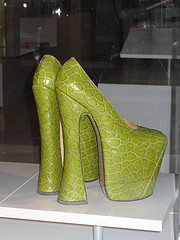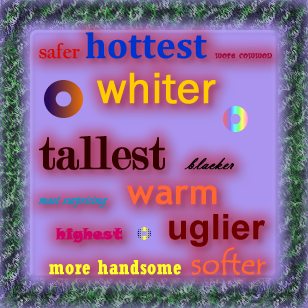2. Paco's clothes are more comfortable than Fenyang's

|
| By autumn bliss. C. Commons |

|
| By sheilaellen. C. Commons |
Have a look at the following sentences that appear in the passage at the beginning of the topic.
The University was much farther from his home (than the museum was from the hotel)
Whites were legally considered better than blacks in the apartheid years
The situation here must have been far harder than we've always thought in other countries
One of the kindest and most interesting men I've ever known
He looked more handsome than me
Planes are safer and faster than any other means of transport
What kind of sentences are they?
Farther, better, harder, kindest, most interesting, more handsome, safer and faster are all adjectives in the comparative or the superlative degree. Adjectives have three degrees: positive, comparative and superlative.
|
|
Positive degree: This is the base form of the adjective. Remember that all adjectives refer to nouns and accompany them, attributively or predicatively. E.g.: Paco usually wears casual clothes.
Comparative degree: This degree is used whenever we want to compare the qualification of a noun (person, animal, object or place) with that of another noun. E.g.: Paco's clothes are more casual than Fenyang's.
Superlative degree: This degree is used to indicate the greatest quality of the noun among all the nouns referred to. E.g.: Paco's are the most casual clothes in the hotel.
The comparative and superlative degrees of adjectives are formed depending on the number of syllables an adjective has. On the other hand there are irregular adjectives that have their own comparative and superlative forms and which will be studied later.
Watch the video to see more examples of comparatives and superlatives before studying how to form them according to the number of syllables.
 |
Let's see some other interesting examples:
One-syllable adjectives: cheap, clean, nice, right, light, smart, etc.
Two-syllable adjectives: surprised, frightened, amused, pretty, funny, handsome, etc.
Three-or-more-syllable adjectives: surprising, frightening, amusing, interested, interesting, expensive, etc.
Click on the picture on the left to learn how the comparative and superlative degrees of adjectives are formed taking into account the number of syllables they have. Now, click here to listen to an amusing song to remember it!
|
|
There are lots of websites to study and practice the comparative and superlative degrees of adjectives. To begin with, you can watch the video on the right to attend an interesting lesson on the subject.
Now, to read the grammar rules and more examples, click either here or here.
Of all the sites to practice it, we have chosen the following ones. Click on them to improve your knowledge on the subject!
| Exercise 1 | Exercise 2 |
Exercise 3 |
Exercise 4 |
Exercise 5 |
If you click here, you'll find both, an interesting explanation and a good activity.
Finally, listen to this song by Taio Cruz and recognize the comparative and superlative adjectives the singer uses. |
ugly - -
casual - -
beautiful - -
red - -
bright - -
good - -
intelligent - -
clever - -
bad - -
far - / - /
